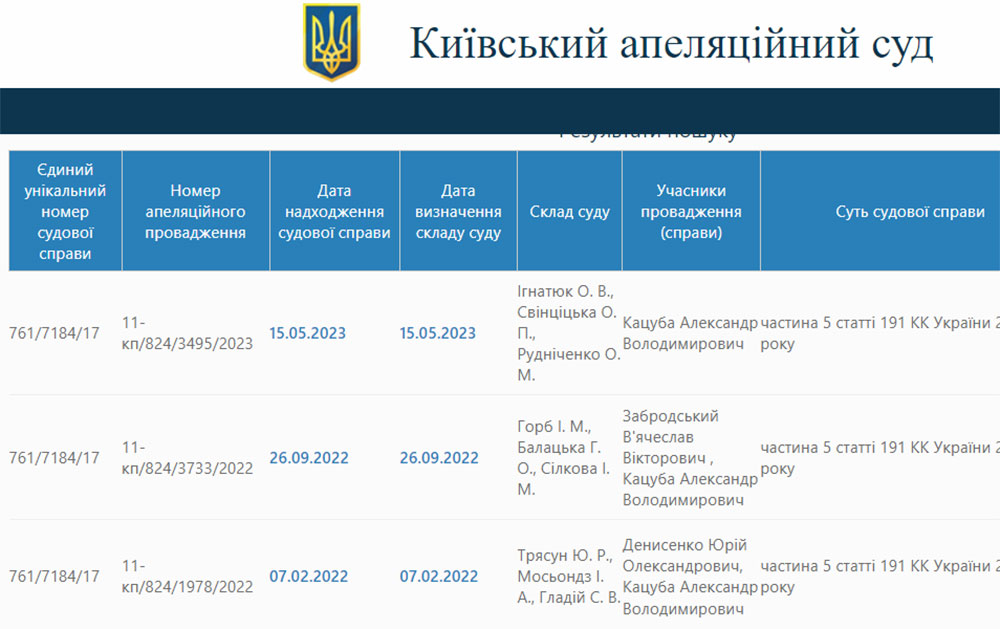Александр Кацуба, бывший заместитель председателя правления «Нафтогаз Украины», стремился осуществить апелляцию по приговору 2017 года.
Киевский апелляционный суд отказал осужденному за коррупционное преступление бывшему заместителю председателя правления компании «Нафтогаз Украины» Александру Кацубе в восстановлении срока на обжалование приговора шестилетней давности. Как стало известно «Главкому», соответствующее постановление апелляция вынесла 11 декабря.
В мае 2023 года Кацуба подал апелляционную жалобу на приговор Шевченковского районного суда Киева от 10 марта 2017 года. Согласно приговору, обвиняемый заключил с прокурором соглашение о признании виновности по статьям «Создание преступной организации» (ч.1 статьи 255 Уголовного кодекса) и «Присвоение имущества путем злоупотребления служебным положением» (ч.5 статьи 191 Уголовного кодекса). Кацубе был приговорен один год и пять месяцев тюрьмы, которые были зачислены «по закону Савченко» (до вынесения приговора фигурант сидел в СИЗО, поэтому один день предварительного заключения посчитали за два дня лишения свободы). Также он уплатил в бюджет 100 млн грн.
Вместе с тем Александр Кацуба пытался убедить апелляцию, мол, в день приговора ему не вручили копию самого решения, а также не прислали по месту жительства. Более того: осужденный заявил, что через семь дней после приговора (17 марта 2017 года) вынужденно с семьей выехал из Украины в Испанию из-за давления правоохранителей. Там прожил почти три года и 30 января 2020 года снова вернулся в Украину. По его словам, карантин из-за Covid-19 и военное положение в Украине помешали вовремя обжаловать приговор.
В суде прокурор возражал против удовлетворения ходатайства осужденного. Назвал доводы Кацубы необоснованными и просил оставить ходатайство без удовлетворения.
Коллегия судей апелляционной инстанции пришла к выводам: приведенные осужденным причины пропуска срока на подачу апелляционной жалобы, которые сводились к пандемии, введенного в Украине военного положения и политического давления, не могут быть признаны уважительными. Зато пропуск сроков на апелляцию связан с несоблюдением осужденным требований закона о порядке и сроке апелляционного обжалования приговора, добавил суд.
Киевский апелляционный суд также отметил, что на момент вынесения приговора в 2017 году Александр Кацуба присутствовал в судебном заседании во время принятия и провозглашения приговора; имел защитника, который был знаком с содержанием приговора. Кроме этого, адвокат Кацубы под расписку получил две копии приговора Шевченковского районного суда города Киева от 10 марта 2017 года, одну из которых должен был передать клиенту.
Также суд выяснил, что в 2022 году адвокаты Кацубы пытались обжаловать приговор шестилетней давности, но безуспешно.
«Учитывая изложенное, приведенные осужденным аргументы в обоснование уважительности причин пропуска срока на апелляционное обжалование приговора Шевченковского районного суда города Киева от 10 марта 2017 года не являются убедительными, в связи с чем не признаются коллегией судей уважительными», — отметил апелляционный суд.

Несколько ремарок относительно попыток Кацубы «демонтировать» приговор 2017 года. По данным судебного реестра, накануне большой войны защитники Кацубы начали подготовку к отбеливанию репутации клиента. Однако в мае 2022-го Киевский апелляционный суд отказал в попытке восстановить срок на обжалование приговора. Аргументы те же, что в свежем решении: Кацуба лично был на заседании 17 марта 2017 года, слышал приговор, его адвокат расписался, что взял две копии приговора. То есть у осужденного было достаточно времени, чтобы обжаловать в апелляции и не ждать пять-шесть лет.
После неудачной попытки защита экс-заместителя председателя правления «Нафтогаза» пошла в Верховный суд с намерениями отменить постановление апелляции об отказе. На этот раз объяснения адвокатов сводились к тому, что 17 марта 2017 года председательствующий судья зачитал резолютивную часть приговора, а не полный текст. Плюс полный текст приговора отсутствует в судебном реестре. Вроде бы все это в куче, по мнению адвоката, помешало Кацубе в течение 30 дней обжаловать приговор. Верховный суд с этим не согласился и насмешливо заметил: «Непрофессионализм осужденного в сфере правоведения также не может быть основанием для возобновления срока обжалования судебного решения, поскольку в суде первой инстанции его защиту осуществлял профессиональный защитник».
Добавим, что суть дела Александра Кацубы касается махинаций с топливом на сумму более 450 млн грн. В 2012-2013 годах, находясь на должности заместителя председателя правления «Нафтогаза», он помог компании бизнесмена Сергея Курченко «Газ Украины 2020» украсть у «Нафтогаза» бензин на более 450 млн грн. Для завладения средствами использовались схемы фиктивных закупок нефтепродуктов.
Кроме этого, Александр Кацуба фигурант еще одного громкого дела — так называемых «вышек Бойко». Во времена правления Виктора Януковича государственная компания «Черноморнефтегаз», где заместителем директора работал Кацуба, купила у фирмы-прокладки две морские буровые установки с переплатой около $300 млн.
В то же время у Александра Кацубы — собственная версия. В частности, он признал, что в 2012 году был причастен к процессу закупки двух нефтедобывающих вышек, будучи в должности заместителя финансов «Черноморнефтегаза». «Я был одним из примерно 15-20 человек, которые визировали документы после того, как они прошли все согласования. Договоры я не подписывал, уполномоченными доказывать соглашение были первые лица «Черноморнефтегаза» и «Нафтогаза», заместители выполняли роль исполнителей на своем участке работы», — сказал Кацуба. Также он назвал себя «слишком маленьким человеком в структуре газовой отрасли» в тот период времени.
Вместе с тем, экс-чиновник времен Януковича не дал четкого объяснения: если не считает себя виновным, то почему сразу не обжаловал приговор. Только отметил, что шесть лет назад не имел ни одного шанса доказать невиновность.
Ранее источник «Главкома», который знаком с материалами уголовного производства, обратил внимание на определенный прецедент, который возник с пересмотром дела Александра Кацубы. «Получается, что Кацуба отказывается от заключенного соглашения. При таких условиях он должен вернуться за решетку. Если апелляция оправдает Кацубу, тогда можно считать разрушенным институт заключения соглашений о признании виновности. Ведь подобных решений в Украине еще не было», — отметил собеседник издания.


